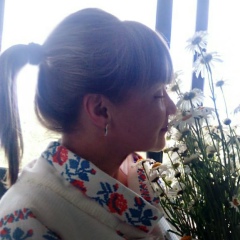Сбежать и хлопнуть дверью
Многие из нас привыкли справляться с невыносимыми чувствами обиды, боли, гнева на партнера, просто уходя из контакта - "хлопать дверью" - пусть не навсегда, на время, "пока не остыну".
Вместо того, чтобы выразить свой гнев экологичным способом, вместо того, чтобы рассказать об обиде или боли, я просто ухожу, сбегаю, мне так безопаснее.
И внутренние формулировки могут быть разные. "Пусть сам(а) догадается, чем меня обидел(а), если любит меня, не может не знать" - это о том, что я чувствую себя уязвимым, говоря о своей боли и обиде, а еще боюсь, что меня оттолкнут, обесценят мою боль. Помните родительский голос? "Да что ты обижаешься, о чем тут плакать, ерунда какая!" Или вариант: "Навыдумывал(а) себе! Тебе не может быть обидно!" Или еще лучше: "Сам(а) виноват(а)!"
Или такая распространенная советская тема с тем, что родитель обижается, а ребенок должен чувствовать себя виноватым и просить прощения. Я если не так попросил, то стой в углу, пока нормально не извинишься. Не 5 минут - просто, как пауза, чтобы ребенок остыл (и это даже не наказание, а обозначение границ позволительного) - а пока он не почувствует себя полностью униженным и на все готовым.
А бывает так. "Я страшно злюсь и сбегаю, потому что мне кажется, что гнева у меня стооолько, что я разрушу своим гневом партнера". Почему так кажется? А потому что родитель в моем детстве не справлялся с моим гневом и вел себя так (например, тоже мгновенно уходил из контакта), что я решил(а): "Если уж такая большая мама убегает от моей злости, то наверно моей злости слишком много и она опасна для людей".
Детям свойственно эгоцентричное мышление. Не мама не справляется, а со мной что-то не так.
В результате, когда мне больно в отношениях сейчас, я сбегаю.
А партнер чаще всего считывает это как "ты от меня сбегаешь, я тебе не нужен".
Но чаще бывает так, что и у партнера были такие же паттерны взаимодействия в родительской семье (и именно это привело вас к созданию пары, вы узнали "своего"), тогда для него это сигнал "ты сбегаешь, я должен(на) догнать!"
В результате отношения превращаются в эдакие "отношения на резиночке": партнер оттянулся - я притянулся(лась), я оттянулся(лась) - партнер притянулся.
Это работает, работает годами, даже есть привычные уже точки взаимодействия, в которых эти оттяжения и притяжения происходят. Это выматывает. Это может вымотать настолько, что человек решает выйти из этих отношений. Второму обычно очень больно это перенести. Ведь раньше оттяжение предшествовало сближению, а теперь все. И непонятно, что делать.
И в этот момент человек и идет к психологу или иным образом начинает разбираться с травмами детства. А если не начинает и не разбирается, то вступает в новые отношения, которые на первом этапе кажутся целительными и правильными, но спустя время приводят к той же схеме.
Если вы замечаете за собой, что у вас есть привычка убегать из некомфортного контакта, не высказывать свои чувства, не договариваться, не спокойно уходить, а именно сбегать на пике чувств, - возможно имеет смысл обратить внимание на эти самые чувства и эмоции, которые принуждают сбежать. И это будет первый шаг к качественно новым отношениям. Второй шаг - научиться их экологично высказывать партнеру (и не сбегать), но для начала важно научиться осознавать и принимать их в себе.
Евгения Шульман
Многие из нас привыкли справляться с невыносимыми чувствами обиды, боли, гнева на партнера, просто уходя из контакта - "хлопать дверью" - пусть не навсегда, на время, "пока не остыну".
Вместо того, чтобы выразить свой гнев экологичным способом, вместо того, чтобы рассказать об обиде или боли, я просто ухожу, сбегаю, мне так безопаснее.
И внутренние формулировки могут быть разные. "Пусть сам(а) догадается, чем меня обидел(а), если любит меня, не может не знать" - это о том, что я чувствую себя уязвимым, говоря о своей боли и обиде, а еще боюсь, что меня оттолкнут, обесценят мою боль. Помните родительский голос? "Да что ты обижаешься, о чем тут плакать, ерунда какая!" Или вариант: "Навыдумывал(а) себе! Тебе не может быть обидно!" Или еще лучше: "Сам(а) виноват(а)!"
Или такая распространенная советская тема с тем, что родитель обижается, а ребенок должен чувствовать себя виноватым и просить прощения. Я если не так попросил, то стой в углу, пока нормально не извинишься. Не 5 минут - просто, как пауза, чтобы ребенок остыл (и это даже не наказание, а обозначение границ позволительного) - а пока он не почувствует себя полностью униженным и на все готовым.
А бывает так. "Я страшно злюсь и сбегаю, потому что мне кажется, что гнева у меня стооолько, что я разрушу своим гневом партнера". Почему так кажется? А потому что родитель в моем детстве не справлялся с моим гневом и вел себя так (например, тоже мгновенно уходил из контакта), что я решил(а): "Если уж такая большая мама убегает от моей злости, то наверно моей злости слишком много и она опасна для людей".
Детям свойственно эгоцентричное мышление. Не мама не справляется, а со мной что-то не так.
В результате, когда мне больно в отношениях сейчас, я сбегаю.
А партнер чаще всего считывает это как "ты от меня сбегаешь, я тебе не нужен".
Но чаще бывает так, что и у партнера были такие же паттерны взаимодействия в родительской семье (и именно это привело вас к созданию пары, вы узнали "своего"), тогда для него это сигнал "ты сбегаешь, я должен(на) догнать!"
В результате отношения превращаются в эдакие "отношения на резиночке": партнер оттянулся - я притянулся(лась), я оттянулся(лась) - партнер притянулся.
Это работает, работает годами, даже есть привычные уже точки взаимодействия, в которых эти оттяжения и притяжения происходят. Это выматывает. Это может вымотать настолько, что человек решает выйти из этих отношений. Второму обычно очень больно это перенести. Ведь раньше оттяжение предшествовало сближению, а теперь все. И непонятно, что делать.
И в этот момент человек и идет к психологу или иным образом начинает разбираться с травмами детства. А если не начинает и не разбирается, то вступает в новые отношения, которые на первом этапе кажутся целительными и правильными, но спустя время приводят к той же схеме.
Если вы замечаете за собой, что у вас есть привычка убегать из некомфортного контакта, не высказывать свои чувства, не договариваться, не спокойно уходить, а именно сбегать на пике чувств, - возможно имеет смысл обратить внимание на эти самые чувства и эмоции, которые принуждают сбежать. И это будет первый шаг к качественно новым отношениям. Второй шаг - научиться их экологично высказывать партнеру (и не сбегать), но для начала важно научиться осознавать и принимать их в себе.
Евгения Шульман
Run away and slam the door
Many of us are accustomed to cope with unbearable feelings of resentment, pain, anger at a partner, simply leaving the contact - “slam the door” - even if not forever, temporarily, “until I cool down”.
Instead of expressing my anger in an environmentally friendly way, instead of talking about resentment or pain, I just walk away, run away, it's safer for me.
And the internal language may be different. "Let him (a) guess what offended me (a), if he loves me, cannot help but know" - this is about how I feel vulnerable, talking about my pain and resentment, but also I'm afraid that I will be pushed away, will devalue my pain. Remember the parental voice? "Why are you offended, what is there to cry about, what nonsense!" Or the option: "I invented (a) myself! You can’t be offended!" Or even better: "Himself (a) to blame (a)!"
Or such a common Soviet topic that the parent is offended, and the child should feel guilty and ask for forgiveness. If I asked not so, then stand in the corner until you apologize normally. Not 5 minutes - just like a pause for the child to cool down (and this is not even a punishment, but the designation of the boundaries of the permissible) - and until he feels completely humiliated and ready for anything.
But it happens. "I am terribly angry and run away because it seems to me that I have so much anger that I will destroy my partner with my anger." Why do you think so? And because the parent in my childhood could not cope with my anger and behaved in such a way (for example, also instantly left the contact) that I decided (a): "If such a big mother runs away from my anger, then there must be too much of my anger and it is dangerous to people. "
Self-centered thinking is characteristic of children. Not my mother can’t cope, but something is wrong with me.
As a result, when it hurts me in a relationship now, I run away.
And the partner most often reads this as "you are running away from me, you do not need me."
But more often it happens that the partner also had the same patterns of interaction in the parent family (and this is what led you to create a couple, you recognized “your own”), then for him this is a signal “you run away, I have to catch up!” "
As a result, the relationship turns into a kind of "relationship on the rubber band": the partner pulled out - I pulled (las), I pulled (lashed) - the partner pulled.
It works, works for years, even there are already familiar points of interaction at which these pulls and pulls occur. It is exhausting. It can be so exhausting that a person decides to get out of this relationship. The second is usually very painful to bear. After all, before the pull was preceded by rapprochement, and now everything. And it is not clear what to do.
And at this moment, a person goes to a psychologist or otherwise begins to deal with childhood injuries. And if he does not start and does not understand, then he enters into new relationships, which at the first stage seem healing and correct, but after a while lead to the same pattern.
If you notice for yourself that you have a habit of running away from uncomfortable contact, not expressing your feelings, not agreeing, not calmly leaving, but running away at the peak of feelings, it may make sense to pay attention to these very feelings and emotions that force to run away. And this will be the first step towards a qualitatively new relationship. The second step is to learn how to make them environmentally friendly to your partner (and not to run away), but first it’s important to learn how to be aware and accept them in yourself.
Evgenia Shulman
Many of us are accustomed to cope with unbearable feelings of resentment, pain, anger at a partner, simply leaving the contact - “slam the door” - even if not forever, temporarily, “until I cool down”.
Instead of expressing my anger in an environmentally friendly way, instead of talking about resentment or pain, I just walk away, run away, it's safer for me.
And the internal language may be different. "Let him (a) guess what offended me (a), if he loves me, cannot help but know" - this is about how I feel vulnerable, talking about my pain and resentment, but also I'm afraid that I will be pushed away, will devalue my pain. Remember the parental voice? "Why are you offended, what is there to cry about, what nonsense!" Or the option: "I invented (a) myself! You can’t be offended!" Or even better: "Himself (a) to blame (a)!"
Or such a common Soviet topic that the parent is offended, and the child should feel guilty and ask for forgiveness. If I asked not so, then stand in the corner until you apologize normally. Not 5 minutes - just like a pause for the child to cool down (and this is not even a punishment, but the designation of the boundaries of the permissible) - and until he feels completely humiliated and ready for anything.
But it happens. "I am terribly angry and run away because it seems to me that I have so much anger that I will destroy my partner with my anger." Why do you think so? And because the parent in my childhood could not cope with my anger and behaved in such a way (for example, also instantly left the contact) that I decided (a): "If such a big mother runs away from my anger, then there must be too much of my anger and it is dangerous to people. "
Self-centered thinking is characteristic of children. Not my mother can’t cope, but something is wrong with me.
As a result, when it hurts me in a relationship now, I run away.
And the partner most often reads this as "you are running away from me, you do not need me."
But more often it happens that the partner also had the same patterns of interaction in the parent family (and this is what led you to create a couple, you recognized “your own”), then for him this is a signal “you run away, I have to catch up!” "
As a result, the relationship turns into a kind of "relationship on the rubber band": the partner pulled out - I pulled (las), I pulled (lashed) - the partner pulled.
It works, works for years, even there are already familiar points of interaction at which these pulls and pulls occur. It is exhausting. It can be so exhausting that a person decides to get out of this relationship. The second is usually very painful to bear. After all, before the pull was preceded by rapprochement, and now everything. And it is not clear what to do.
And at this moment, a person goes to a psychologist or otherwise begins to deal with childhood injuries. And if he does not start and does not understand, then he enters into new relationships, which at the first stage seem healing and correct, but after a while lead to the same pattern.
If you notice for yourself that you have a habit of running away from uncomfortable contact, not expressing your feelings, not agreeing, not calmly leaving, but running away at the peak of feelings, it may make sense to pay attention to these very feelings and emotions that force to run away. And this will be the first step towards a qualitatively new relationship. The second step is to learn how to make them environmentally friendly to your partner (and not to run away), but first it’s important to learn how to be aware and accept them in yourself.
Evgenia Shulman

У записи 36 лайков,
9 репостов,
1219 просмотров.
9 репостов,
1219 просмотров.
Эту запись оставил(а) на своей стене Евгения Шульман























































